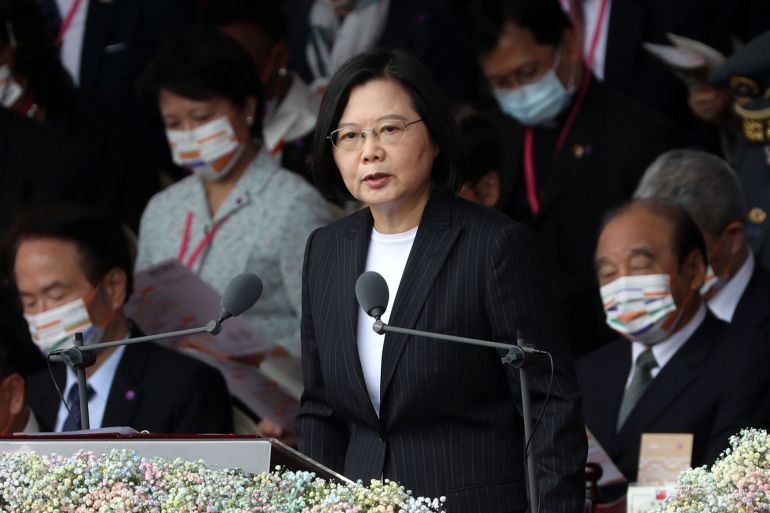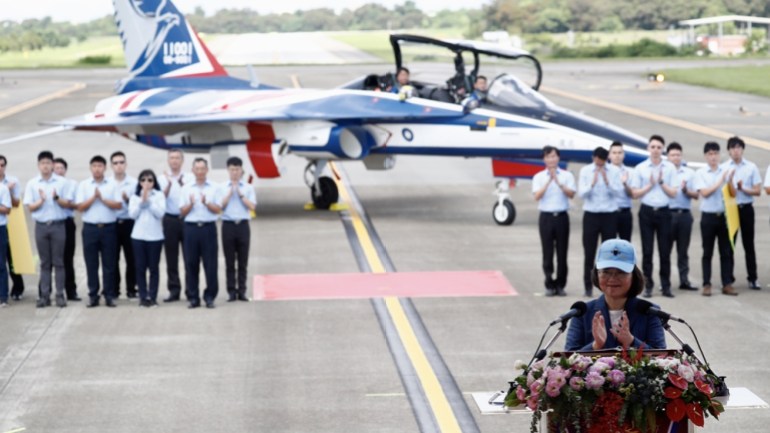Taiwan to strengthen defences as China tensions escalate
In speech marking island’s National Day, President Tsai Ing-wen also called for dialogue with China.

President Tsai Ing-wen on Saturday promised to strengthen Taiwan’s defences and work more closely with regional partners on security as she called for ‘meaningful dialogue’ with China, which claims the island as its own.
In a speech to mark Taiwan’s National Day, Tsai said the government would continue to modernise the island’s defence capabilities and enhance its capacity for asymmetric warfare to “deal with military expansion and provocation from the other side of the Taiwan Strait”. Asymmetric warfare is designed to make any Chinese attack difficult and costly, for example with smart mines and portable missiles.
Keep reading
list of 4 itemsUS warns China against Taiwan attack, stresses US ‘ambiguity’
Taiwan says 46 incidents involving Chinese planes in last 9 days
China conducts more exercises near Taiwan as US official visits
She also stressed the need for dialogue across the strait to reduce tension.
“As long as the Beijing authorities are willing to resolve antagonisms and improve cross-strait relations, while parity and dignity are maintained, we are willing to work together to facilitate meaningful dialogue,” she said.
“Maintaining stability in cross-strait relations is in the best interests of both sides. We are committed to upholding cross-strait stability, but this is not something Taiwan can shoulder alone; it is the joint responsibility of both sides.”
Self-ruled Taiwan, claimed by China as its own territory, has come under increasing pressure from Beijing since Tsai was first elected in 2016. It has intensified manoeuvres since she was returned to office in a landslide in January and has stepped up air force activity near the island in the past few weeks sometimes crossing the Taiwan Strait’s sensitive midline that normally serves as an unofficial buffer zone.

China says it is responding to “collusion” between Washington and Taipei, and is angered by the United States’ growing support for the island.
Advocate for good
The US is Taiwan’s biggest backer but like most countries has no formal diplomatic ties with the island. It has been pushing Taiwan to modernise its military so the country can become a “porcupine”, small but hard to attack.
Tsai won re-election on a promise to stand up to China, as well as her commitment to democracy and human rights, both values she emphasised again on Saturday.
Noting sovereignty disputes in the South China Sea, the East China Sea and along the India-China border, as well as China’s imposition of the National Security Law in Hong Kong, Tsai said it was “clear that democracy, peace and prosperity in the Indo-Pacific are currently facing serious challenges.”
Taiwan would continue to forge alliances with like-minded nations, she said.
“We want to be an advocate for the forces of good, and share our progressive and good faith values with the whole world,” Tsai told the crowd.
The National Day celebrations were scaled back because of the COVID-19 pandemic, but Tsai devoted much of her speech to the success of Taiwan’s response to the disease and the heroism of those on the front line.